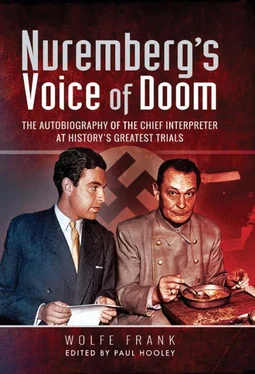Wolfe Frank
NUREMBERG’S VOICE of DOOM
THE AUTOBIOGRAPHY OF THE CHIEF INTERPRETER AT HISTORY’S GREATEST TRIALS
Edited by Paul Hooley
DEDICATED TO THE MEMORY OF WOLFE FRANK

INTRODUCTION
In 2015 retired panel beater and paint sprayer Mike Dilliway was about to move home. During the course of clearing out his property he came across some six to eight cardboard boxes, a number of files and two briefcases crammed full of assorted papers – mostly in English but some in German – that he had not thought about for many years.
Mike had inherited this cache of documents from a gentleman he had befriended in the Wiltshire village of Mere – where his business had been based – and, not knowing quite what to do with them, had placed them in his loft for safe keeping. Mike recalled that his friend had often mentioned he had been involved as a translator and an interpreter at the trials of the Nazi war criminals in Nuremberg, and that he had also once been a successful businessman. Illness and some unfortunate involvements in both his professional and personal life had however reduced him to a low ebb – physically and financially – and this had led him to take his own life in 1988.
So impoverished had Mike’s friend become during the period leading up to his death that he had been forced to approach his local authority for accommodation, furniture and financial support. He was also overdrawn at the bank and a utility supplier was threatening to take him to court over an unpaid debt. There was nothing of value amongst the chattels of the deceased and there was no money left within his estate. Rather than see his friend suffer the indignity of a pauper’s burial Mike Dilliway settled his affairs, paid the funeral expenses, distributed what little furniture there was to local charities and consigned the aforementioned documents to his attic where they laid undisturbed for over a quarter of a century.
Needing to make a decision on what to do with the collection and not knowing quite what he had – Mike asked me (as a writer he knew who had an interest in historical and military matters) if I would take a look at the material to see if there was anything there that might be of importance.
I inwardly shuddered when I took delivery of the consignment, not just because of the sheer volume of paperwork involved but because it was in no particular order. I was at a loss as to know where to start.
Start I did however and twelve months later – after having sorted, resorted, catalogued, assessed, researched and checked several thousand sheets of data – I had a complete picture of the life of Wolfe Frank, Chief Interpreter at the Nuremberg Trials. Whilst my heart may have initially sunk at the thought of the task ahead of me, my pulse quickened with almost every piece of paper I investigated and by the end of my researches that same heart had soared with excitement at the realisation of the important discoveries I had made and the knowledge I had acquired – knowledge I felt compelled to share with a wider audience.
This book therefore is the result of those discoveries. It consists of a posthumous autobiography of the first half of Wolfe Frank’s astonishing life – that stands up to the closest scrutiny – plus a potted biography of his later days (based on his memoirs) and further added information that chronicles the life, times and involvements of a brave, dedicated and gifted man whose exploits and achievements should not be allowed to fade into obscurity.
Frank’s participation throughout the trials at Nuremberg places him in the quite unique position of having been totally immersed in the proceedings from the very first day of the war crimes investigations – he was asked to translate the then only known piece of evidence. He then became one of the most active players in the forensic and interrogations processes and the setting up and pioneering of the world’s first ever system of simultaneous interpretation (a triumph in itself). Once the International Military Tribunal (IMT) started, Frank became a central figure in all stages of the trials. He interpreted the Tribunal’s opening remarks, was used more than any other interpreter during the ten month duration of the IMT, and then finally brought proceedings to a close by informing the defendants of their fate – a duty, simultaneously listened to by an estimated radio audience of four hundred million.
It is true to say therefore that the first and last words the defendants heard in their own language at Nuremberg were uttered by Wolfe Frank, a man they – like the Tribunal, the prosecutors and their own counsels – trusted implicitly and for whom they had the highest possible regard and respect.
These memoirs add substantially to what is already known about the trials and include further important insights about what went on behind the scenes. They include details of personal encounters with defendants Goering, Ribbentrop, Keital, Kaltenbrunner, Speer, et al. as seen through the eyes of one (perhaps the only one) who was involved at every stage of what has been described as having been ‘the greatest trial in history’. [1] Sir Norman Birkett, the Alternate British Member of the International Military Tribunal (IMT) at Nuremberg.
Within his manuscript Wolfe states: ‘I had been involved in the writing of a chapter of human history that would be read, talked about and remembered forever. I had been more totally and decisively immersed in recording the horrors of the war than most of the millions who had fought in it.’
By the time I had concluded my investigations I knew it was my duty to ensure that Frank’s involvements at, and remembrances of, the Nuremberg Trials were more properly documented. It was also very clear to me that he hoped his insights of the events, as part of his life’s story, would be published posthumously to complete the record he refers to in his comment above.
Frank’s contributions were considered to be major factors in seeing that justice was fairly and meticulously interpreted and translated to all parties in a way that, it is said, shortened proceedings by an estimated three years, and by the end of the trials he was considered to be the finest interpreter in the world – as these few, of many, typical observations attest:
‘The Office of Chief Counsel for War Crimes acknowledged their debt to him [Frank] “for superlative scholarship and administrative assistance… and intellectual integrity… satisfactory alike to the bench, the defence, and the prosecution”.’ – New York Herald Tribune .
‘Wolfe Frank… star of the language division. Given the English he spoke, Frank could have passed himself off as a lord… Frank spoke English with an upper-class accent… and could move flawlessly back and forth between English and German.’ Joseph E. Persico, Nuremberg: Infamy on Trial.
‘Wolfe Frank was by unanimous judgement the best interpreter of the Trial.’ – Francesca Gaiba, The Origins of Simultaneous Interpretation: The Nuremberg Trial .
‘His [Frank’s] use of German and English was noticeably better than that of most native speakers. His voice and manner, the nuances of his vocabulary, the ability to convey the character of the person for whom he was translating were all outstanding.’ – R.W. Cooper, The Nuremberg Trial.
‘In the courtroom, however, we encountered only hostile faces, icy dogmas. The only exception was the interpreters’ booth. From there I might expect a friendly nod.’ – Albert Speer, Minister of Armament and War Production in Nazi Germany who, during the trial, requested and was granted a private audience with Wolfe Frank – Inside the Third Reich: Memoirs by Albert Speer.
Читать дальше













